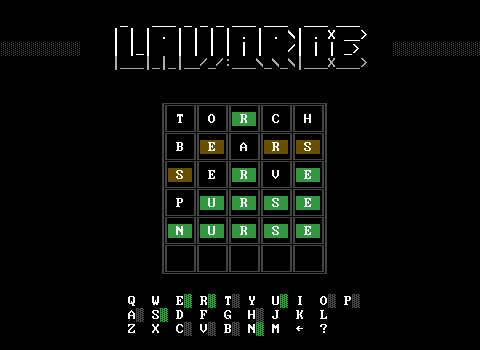Windows 3.1 and MS-DOS development isn't dead! I
went searching for Wordle clones for Win3.1 and DOS, and found way
more than expected.
All-in-all, there are 2 Wordles for Microsoft Windows 3.1, and an
incredible 7 different Wordles for DOS! (Let me know
on Twitter if I missed any.)
When I was testing these, I noticed that some have a common bug
where the highlighting is incorrect and can make it look like
there are more of a letter than there actually is. For example, if
the word is PEACH,
guessing WEEPY will highlight the first E green and
the second E yellow. To be fair, I went back and tested all of
them and marked them as either 🏆 not having the bug, or 🐛 having
the bug.
Wordle is harder to implement than it seems! As another data
point, 3blue1brown also overlooked this subtlety and calculated
the wrong optimal starting word.
This was my favorite Wordle from an aesthetic perspective. It just
fits in, both from a look-and-feel standpoint, and from a technical
standpoint. It really seems like the kind of game that would be
bundled with Windows back in the day.
Windle is
written in Delphi, and the creator has some nice screenshots of the
Delphi experience on their website.
I should also note that this Wordle does not follow the original
once-a-day word list, and also does not share the same dictionary
as the official Wordle. There are both 16-bit and 32-bit versions
- if you're on a 64-bit Windows, the 32-bit version should run
right out of the box. It is also known to run using various
compatibility layers like
WIN-OS/2
and Wine.
WinQuest - LuigiThirty
Another Windows 3.1 Wordle, this one is written in Visual Basic 3
and uses a Microsoft Access database for the corpus. It's an
interesting choice because it requires a lot of libraries, making
the whole thing more than 4 MB. You would need at least two
floppies to distribute this, but it has sound effects!
I also tried this on Linux using Wine, but was not able to get it working.
WORDOS (kajott)
A pretty straightforward implementation that looks a lot like
WOR-DOS and WORDLOS. This was one of the Wordles that I tried on
my IBM PC (with 4.77 MHz Intel 8088), and it actually does support
monochrome. On a monochrome display, instead of yellow and green
backgrounds it shows an underline or inverted
background/foreground.
WOR-DOS (vitawrap)
Pretty similar to WORDOS, but written in Borland Turbo C++ 3.0 (long live Borland!).
WORDLOS (Bruno Croci)
I don't know how to pronounce this and I'm sure I botched the name
in the video, but this looks and feels very similar to the two
games above. It was written in assembly, and you can see the
WORDLOS source code on Github.
DOSDL (nortti)
This is the only one out of the bunch that doesn't attempt any
kind of graphical interface at all — just plain ol' text
I/O. Which presumably makes this the only one that works over a
teletype, but you didn't shell out $1,565 for an IBM PC to run
software remotely, did you?
Laworde (asie)

Laworde probably wins "Most Interesting Implementation" as it's
built on ZZT, Tim Sweeney's adventure game / adventure-game
engine. (Technically, it's built on FirmWeave which is a fork of
ZZT.)
Yes, using the arrow keys to select letters is a bit annoying, but
at that point the animated title with music has already won you
over.
DOSWORD (foxgirl_irl)
DOSWORD is not as big as WinQuest, but it's a sizable binary. But
you get some really nice graphics and even a bonus wavy animation
when you win!
Be aware that is a 32-bit game and you need a relatively newer
machine. The game's page says it requires a 486 or better and
MS-DOS 5 or newer.
